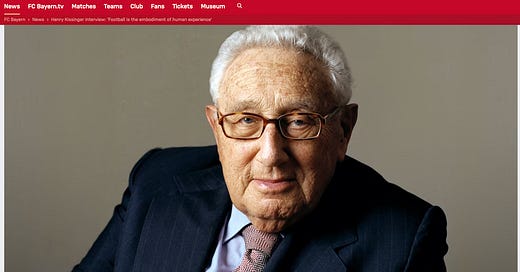War Criminals
The fifth in my series of short summaries about the culture and politics of football.
No one in Germany outside Munich likes Bayern München that much. In the Bundesliga most clubs root against them. They’ve just won their 10th title in a row. The club is like a superpower. So featuring war criminal Henry Kissinger prominently on its website is on brand. The interviewer asks Kissinger such hard-hitting questions as: “You have 100 years of life experience and encounters on the highest world stage. What does football represent? Is it a side note to life, or does it give people much more than they think?”
• Africa is a Country (a site I founded and edit) has a post on Kampala’s Nasser Road, “widely known as the center of Uganda’s printing industry, printing anything from school reports to posters.”
One type of poster stands out: those focusing on politics. They provide commentary on both national and international events. They are striking in a number of ways: they display images of international figures many regard as villains, such as Osama Bin Laden or Saddam Hussein. Then, there’s their aesthetics, which are a mixture of images copied from the internet and flashy colors showing Hollywood action figures such as Robocop or Rambo, that only national and international politicians replace their faces.
I asked the author, Kristof Titeca, a professor at the Institute of Development Policy at the University of Antwerp, whether there are versions of these calendars with a football focus. Kristof: Yes, there are, but they’re less prominent. He sent me these two:
In the Africa Is a Country post, Kristof expands on the visual politics of these posters. He has also published an edited book with Yusuf Serumkuma, Badru Katumba, and Zahara Abdul on it. Sidenote: Kristof has done research on the politics of football in the capital of neighboring DRC.
• When an American commentator who probably hasn’t been to South Africa pronounces a black South African footballer’s name the correct way and the majority of Bongi Hlongwane’s South African white countrymen can’t. There is no excuse.
• Alexander Isak (Newcastle United) wished Eritreans “happy independence day.” He apparently added the ruling party’s slogan. Eritrea is ruled by a repressive, hermit-like regime, and not everyone on the internets is happy. Isak grew up in Sweden (where his parents settled as refugees). It is unclear what his politics are. It will be interesting to see how he manages the highly divisive and emotive politics around Eritrea, especially in its diaspora, and what is expected from public figures (see: Tiffany Haddish, Nipsey Hussle).
• Benni McCarthy, now an assistant coach at Manchester United, is arguably South Africa’s most successful professional footballer. This is not a debate. He has scored the most goals for the national team, Bafana Bafana: thirty-one in eighty international appearances. This includes scoring South Africa’s first-ever goal in a World Cup; against Denmark in France ’98. McCarthy is also the first and only South African to win both UEFA Champions League and the Intercontinental Cup winners’ medals. (David Julio was the first South African to win any European title: the 1963-64 UEFA Cup Winners' Cup with Sporting CP of Portugal.) Benni won both titles playing for Porto FC in 2004. Benni’s achievements are even more impressive when you consider his background. He is from one of Cape Town’s coloured working-class townships (where I am also from) and got his start in the city’s “gangster leagues” before his break with Seven Stars and then moving on to Ajax Amsterdam. I am currently working on a long read about these leagues. More on that sometime later. He is like an icon on the Cape Flats. But he is also a national figure. No surprise then that he has been celebrated by local musicians. Most famously in the run-up to the 1998 World Cup by TKZee (“Shibobo”) and later by AKA (on “Fela in Versace,” and drop on “Mbuzi”). Both TKZee and AKA (he was born in Cape Town) are associated with Johannesburg. Now YoungstaCPT, the Cape Town rapper who built a career off freestyles, has made a Benni song:
• Finally, I made a brief appearance on Al Jazeera English’s Twitterspaces to talk about the long history of racism in Spanish football and what to do about it. Others with more substantive inputs were Maryam Nemazee, Tim Vickery, Clarke Carlisle, Piara Powar and Ashish Malhotra. You can replay the discussion here.
Follow me on Twitter.





